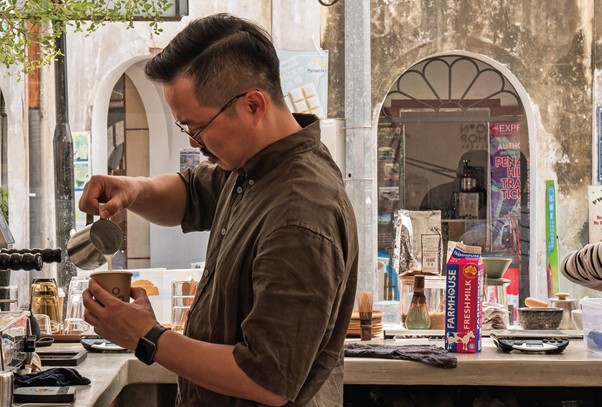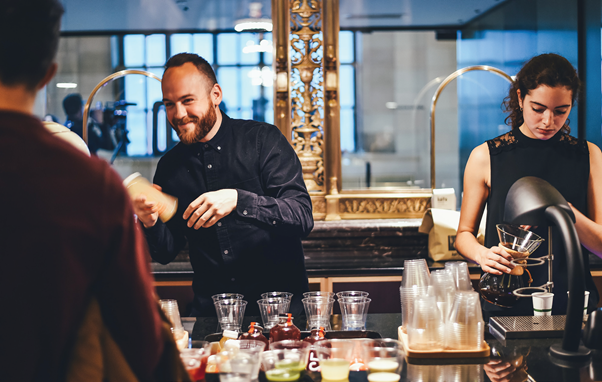With many hospitality professionals reassessing their careers after Covid-19 lockdowns, many coffee shops, bars and restaurants face an acute staffing crisis. 5THWAVE examines the significant challenges facing the hospitality industry as it reopens in the post-pandemic landscape, and what can be done to find and retain the best talent
.jpg.aspx?lang=en-GB)
UKHospitality estimates there are currently around 188,000 vacant hospitality roles in the UK | Photo credit: Ethan Hoover
As Covid-19 has caused extraordinary disruption around the globe, workers worldwide have adapted by shifting to remote working, flexible schedules, and reduced hours. Many have been compelled to rethink their careers entirely.
A global survey of more than 30,000 workers conducted by technology giant Microsoft revealed 41% were considering changing their job or profession in 2021.
While the pandemic has impacted workers everywhere, the effect on hospitality staff has been especially pronounced. Customer-facing roles were among the first to be hit by temporary store closures, are largely unsuited to remote working, and carry a greater risk of exposure to Covid-19.
As a result, hospitality professionals are leaving the industry in droves, with businesses enduring yet more disruption as they attempt to recover from the shock of the pandemic.
Data from the UK’s Office of National Statics (ONS) shows just under 1.65 million hospitality employees were accessing the UK government’s Coronavirus Job Retention Scheme in April 2020 – representing around 25% of all furloughed employees in the UK.
“You can go on from bar to boardroom in a relatively short time”
– Tony Sophoclides, Strategic Affairs Director, UKHospitality
However, even as Covid-19 restrictions have been wound down in the UK and most hospitality businesses have resumed trade in some form, Covid-19 continues to impact customer-facing hospitality staff far more than other sectors of the economy.
“We estimate there are currently around 188,000 vacant hospitality roles in the UK, but there had been an acute shortage of staff even before Covid-19 came along,” says Tony Sophoclides, Strategic Affairs Director of trade association UK Hospitality.
“Many UK hospitality workers lost faith in the industry during the pandemic because it has been the first hit when there’s a lockdown,” Sophoclides adds.
UK Hospitality research indicates six in ten UK hospitality businesses have experienced disruption because of staff needing to self-isolate after coming into close contact with an infected person. In August 2021, the organisation estimated that 267,000 people or 13% of the industry’s workforce had recently been, or were currently, self-isolating after being alerted to Covid-19 exposure by the National Health Service (NHS) app.
The ramifications are stark – UK Hospitality records four in 10 operators have been forced to either fully or partially close, with 47% reduced trading hours. Around six in 10 are relying on remaining staff to work longer hours. Thirty-nine percent have reduced menus and eight percent have moved to a takeaway-only service.

Many hospitality staff are rethinking their careers in the wake of Covid-19
A similar picture has emerged in the US, where the
Bureau of Labor Statistics reports that six million restaurant and bar workers – nearly half the industry – lost their jobs during the first wave of the pandemic in 2020. A further 400,000 lost their job as the virus surged again in January 2021, according to the government organisation.
Not only has this caused the US hospitality industry to haemorrhage expertise, it has also caused a significant headache for businesses preparing to re-open as Covid-19 restrictions have lifted.
“When Covid-19 hit, like most coffee companies, we had to close down our retail operations completely. We had to lay off almost our entire staff – everybody at the retail level and all but a skeleton crew at our headquarters,” says Jonathan Rubinstein, CEO of Joe Coffee, a specialty coffee roaster and café chain with 22 locations across New York.
“There are people who have worked in coffee for a long time and are now re-evaluating where they live and work due to Covid-19”
– Jonathan Rubinstein, CEO, Joe Coffee
As many brick-and-mortar stores resumed trade in late 2020, Rubinstein says the day-to-day challenges of navigating Covid-19 health considerations, such as social distancing and mask wearing, have added to an already costly and time-consuming hiring and training process.
“When we reopened our stores in July 2020, our goal was to train 40 people within a month and a half – and that is a lot. We have a training team of three, but mask wearing and social distancing is difficult when tasting, touching the same cups and being very close to people – all the things necessary for really strong training. That meant we were forced to train in much smaller groups with safety protocols in place.”
In 2021, Joe Coffee continued to encounter significant challenges in sourcing talented staff, with the recruitment process taking far longer than in the pre-pandemic landscape. Rubinstein attributes this to a diminished pool of hospitality talent, as many of the industry’s highly skilled coffee staff reconsider their careers.
“There are people who have worked in coffee for a long time and are now re-evaluating where they live and work due to Covid-19. We respect that, but from a business perspective it has been very challenging,” says Rubenstein.
“Coffee is transforming from a side hustle at university to being something people want to do long-term”
– Jessica Worden, Head of Coffee, Gail’s Bakery
London-based hospitality professional Freddy Speed is among those taking a second look at their career. After a decade working at premium venues, including at 5-star hotels and private members’ clubs in the UK capital, the 27-year-old is now exploring other opportunities, including a career in human resources.
“I have such fondness towards the hospitality industry,” says Speed. “But working 60-65-hour weeks, you’re in a bubble and mainly socialise with colleagues because you’re all working the same hours.”
“Covid-19 and being on furlough has given me time to reflect on what I was missing in life –I hadn’t even had the chance to meet my best friend’s wife.
I’d have loved to join a sports team, but the hours I worked didn’t make this possible. That’s why I’ve decided to step back from hospitality. I want to try having a Monday to Friday, nine-to-five job and see how that feels.”
Changing perceptions
What can hospitality businesses do to turn the tide on the industry’s exodus of staff? According to UK Hospitality’s Sophoclides, the industry must address poor and inaccurate perceptions about industry roles among young people starting their careers.
“The perception of hospitality jobs in the UK tends to be poor and based on misconceptions. The sector is actually quite a meritocracy. You can start collecting pint glasses in a pub and be the general manager within two or three years and can go on from bar to boardroom in a relatively short time.”

Can career progression be baked into hospitality roles?
One such success story is Jessica Worden, Head of Coffee at
Gail’s Bakery, a London-based artisan bakery and coffee chain. Originally from the Netherlands, Worden began her hospitality career as an art student working part-time in coffee shops. She joined Gail’s after completing her master’s degree when the business had just three stores. Ten years later, Gail’s has opened its 70th location, with Worden at the forefront of the brand’s specialty coffee programme.
“The hospitality industry has changed so much since I started, when working practices could be quite hazardous. Many people suffered repetitive strain injuries that would occur over time,” Worden recalls.
Now in charge of Gail’s own coffee training programme, Worden says she has made it her mission to improve the perception of careers in coffee.
“One of the first things I looked into when developing our training programme was how we could make what we do as accessible as possible for a more diverse audience. Today, it’s really exciting that coffee is transforming from a side hustle at university to being something people want to do long-term.”
“Covid-19 and being on furlough has given me time to reflect on what I was missing in life”
– Freddy Speed, UK hospitality professional
It’s clear that the unique requirements of hospitality roles, which often entail unconventional hours and demanding workloads, are not suited for everyone. But with Covid-19 exacerbating the skills and jobs crisis among young people around the world, hospitality’s diverse and increasingly coveted skillsets can make an attractive, life-long career path where the sky is truly the limit.
Whether it’s gaining practical skills as a barista, bar-back or warehouse worker, the hospitality industry provides endless opportunity for entrepreneurship, senior leadership and business ownership. To solve today’s hospitality skills crisis, the industry must continually hammer home these key points and map coherent career pathways to ensure the best and brightest staff want to remain in the industry tomorrow.
For more on the hospitality hiring crisis and ways operators are attracting talent to thier business, tune in to our two-part podcast episodes here and here.
This article was first published in Issue 8 of 5THWAVE magazine.
Subscribe to 5THWAVE to receive each edition in print and digitally or sign up to our newsletter and be the first to read the latest articles and updates on World Coffee Portal research
